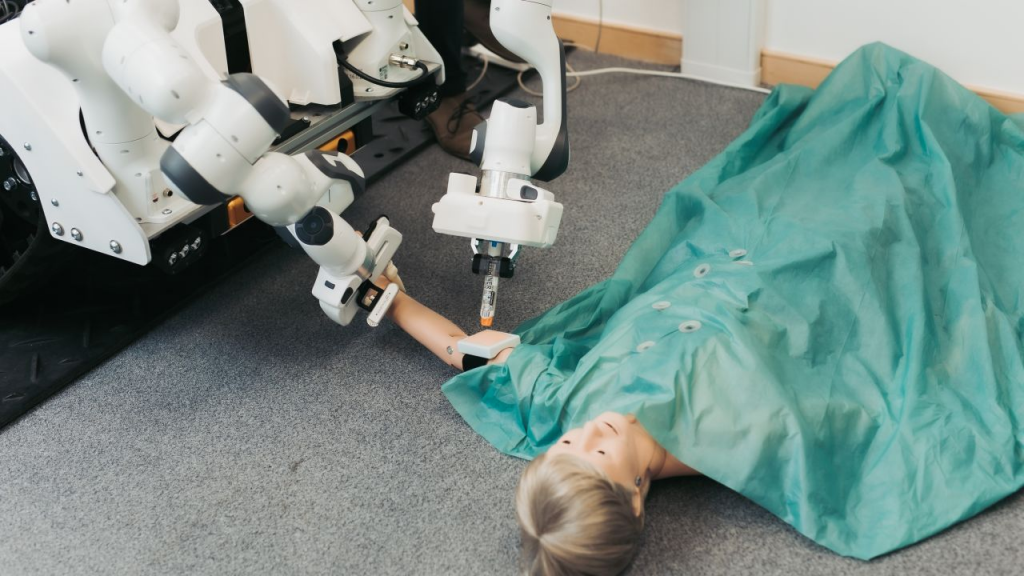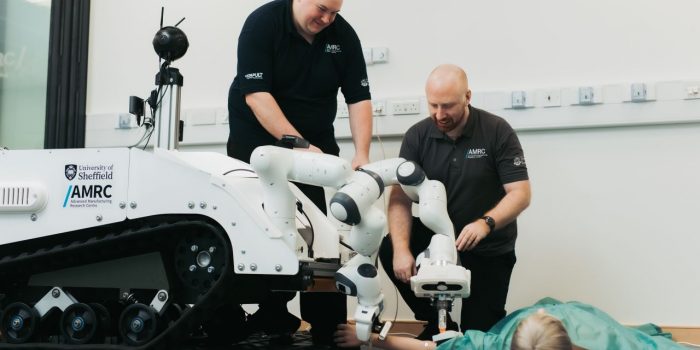Researchers at the University of Sheffield have developed groundbreaking robotics technology called medical telexistence (MediTel), allowing remote medical treatment to be provided to casualties in high-risk emergency environments.
The project led by David King, Head of Digital Design at the AMRC, and Professor Sanja Dogramadzi, Director of Sheffield Robotics, achieved a remarkable feat by developing the MediTel medical telexistence technology in just nine months. This pioneering solution combines advanced robotics systems with existing medical devices to create a platform that enables remote operators to navigate challenging terrains and provide critical diagnoses for high-risk casualties. The ultimate goal is to enhance emergency response services by effectively triaging casualties in hazardous environments.

Speaking about the project’s success, David King expressed his enthusiasm for the potential impact of MediTel: “Our MediTel project has demonstrated game-changing medical telexistence technology that has the potential to save lives and provide remote assessment and treatment of casualties in high-risk environments such as humanitarian disasters.”
The accomplishment of developing a complex system like MediTel within such a short timeframe is a testament to the skills and capabilities of the entire project team.
The MediTel UGV boasts two robotic arms that allow remote operators to operate medical tools and perform critical initial assessments on casualties. Within just 20 minutes, the system can conduct essential checks like temperature, blood pressure, and heart rate measurements, perform palpations and administer pain relief through an auto-injector. Real-time data is streamed to the remote operator, enabling prompt decision-making and efficient treatment.

The potential applications of the MediTel technology extend beyond its current capabilities. Professor Sanja Dogramadzi envisions further research to integrate other sensing modalities and enable resilient autonomy, which could significantly assist patient triage in various remote settings beyond hazardous environments.
The successful development of MediTel was made possible with the support of the Defence Science and Technology Laboratory (Dstl) and the Nuclear Decommissioning Authority (NDA) through the Defence and Security Accelerator (DASA). The technology’s potential to remove end users from harmful environments or quickly insert specialists is particularly appealing to the defense and security sectors.
Looking ahead, the research team is keen to build on the project’s success and seeks additional funding and partnerships to realize MediTel’s potential fully.

The ultimate vision is to evolve the technology into a large-scale integrated medical emergency platform capable of rapid deployment to humanitarian disasters with multiple casualties. This could revolutionize how medical triage is conducted in dangerous incidents where the safety of on-site medical personnel is compromised.
If successfully developed, the MediTel project might open up new possibilities for saving lives and providing critical medical assistance during humanitarian disasters and other hazardous incidents. With further advancements and support, MediTel has the potential to become a game-changer in emergency medical services.


